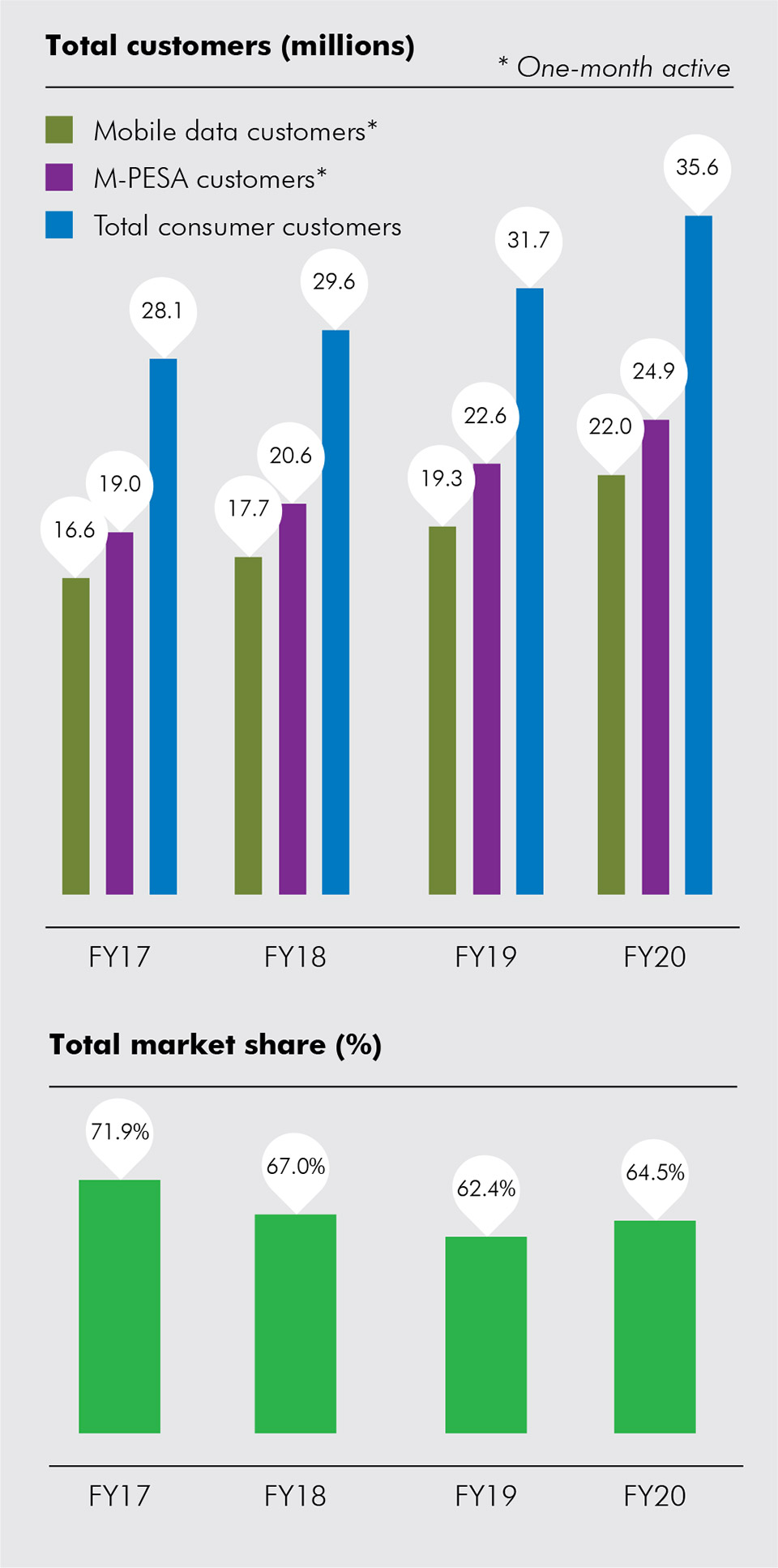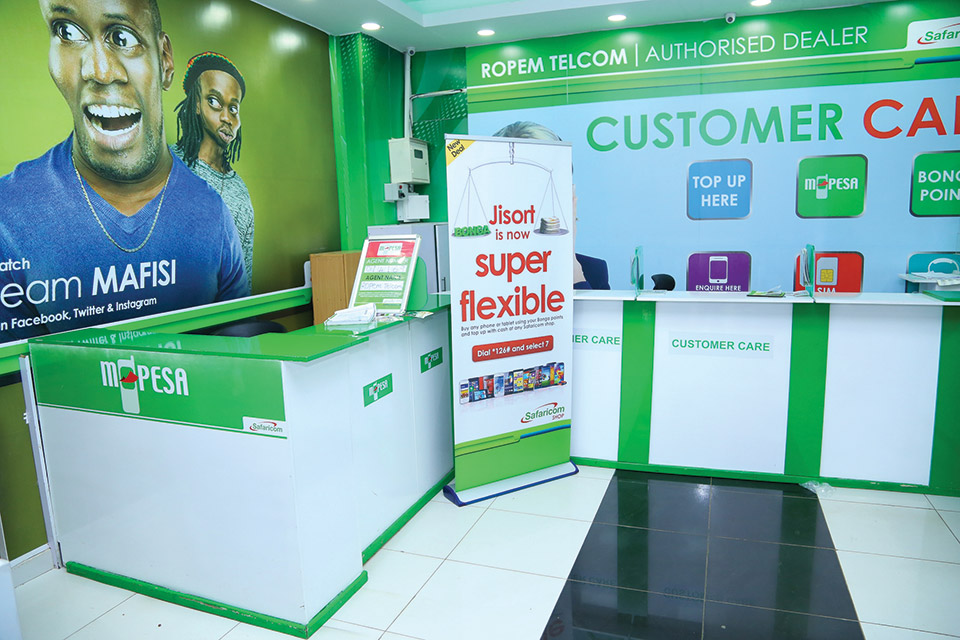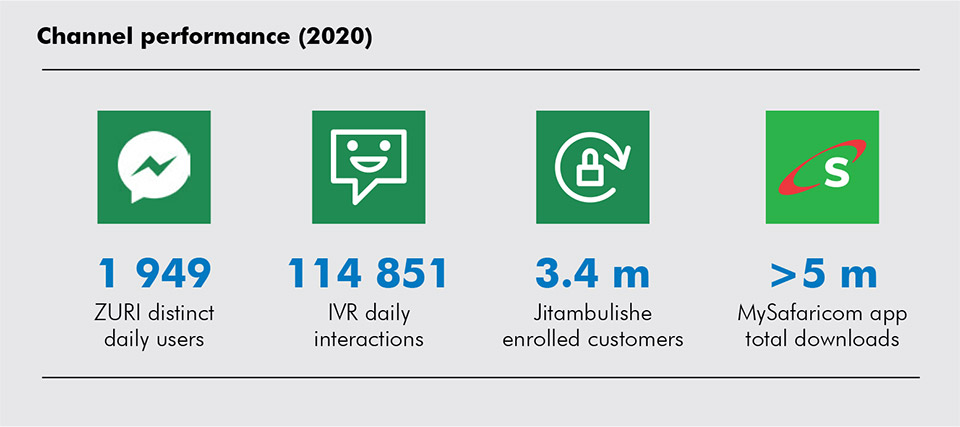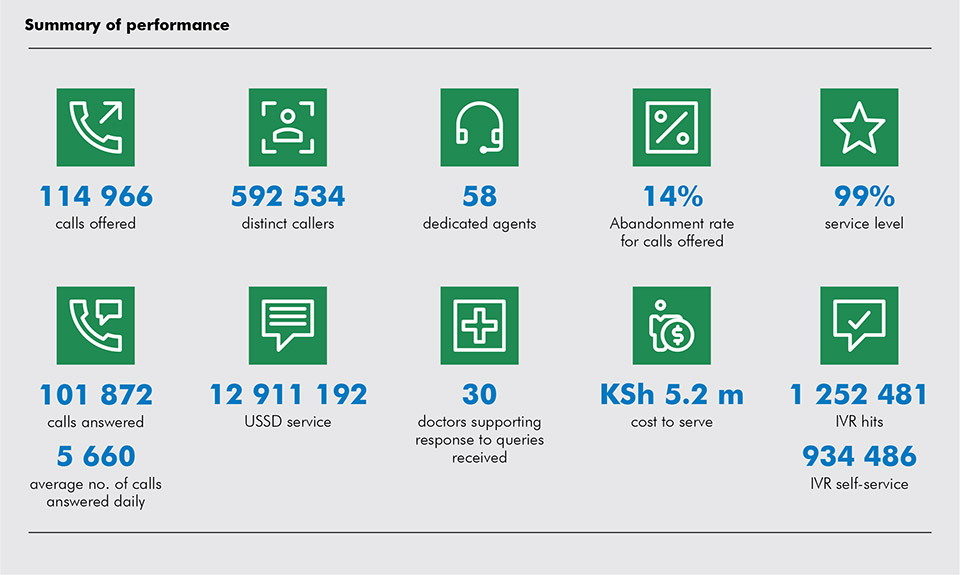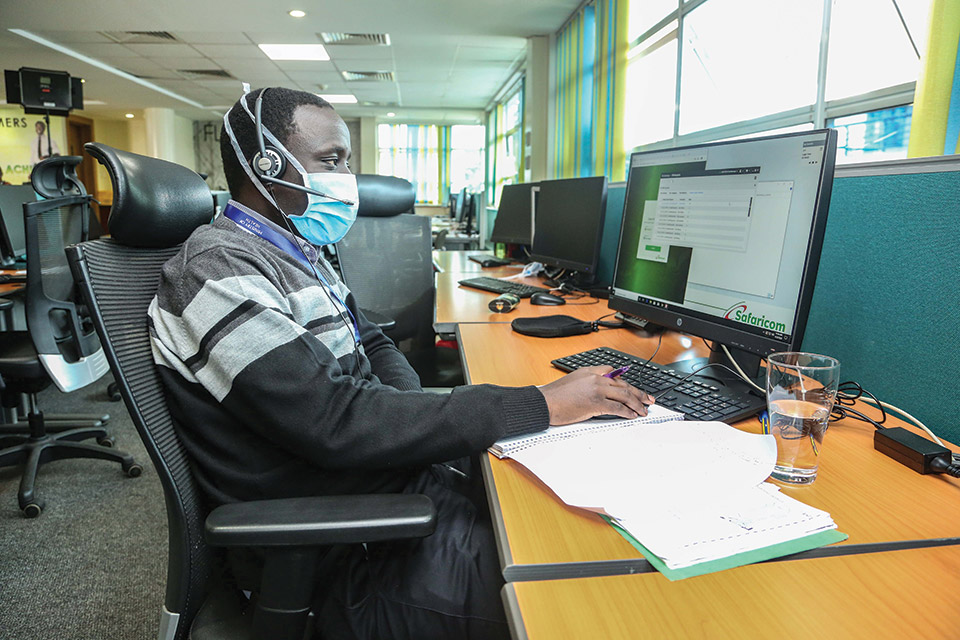Customers
![]() Supporting our customers through COVID-19
Supporting our customers through COVID-19
- Bonga for Good – 1.1 billion loyalty points worth KSh 320 million redeemed by 677 000 customers to purchase food items through 40 000 merchants.
- Double fibre capacity for our 142 000 home fibre customers and 10 000+ enterprise customers.
- Support for the frontline health workers – 5 529 frontline health workers provided with monthly bundles consisting of 12GB data, 600 minutes, and 2 000 SMS since April 2020.
- Supporting e-learning – over 1.7 million learners accessing learning through platforms such as Shupavu 291. We have given free access to learning platforms such as Vuisasa Elimu and Longhorn – 12 million free passes for 100MB of data content have been redeemed by over 1.2 million learners accessing the content.

We recognise the contribution of our products and services to our customers, the economy and to enabling the implementation of the SDGs. We are committed to improving the quality, reliability and coverage of our products and services.
Consumer customers
Despite intensified competition and difficult economic conditions, we added an extra 3.8 million consumer customers during the year and grew our total number of consumer customers to 35.6 million. Our overall market share increased by 2.1 per cent and we finished the year with a 51 per cent share of the gross adds (total number of new subscribers before adjustments) among Kenyan mobile network operators.
Measuring customer satisfaction
We continue to use the Net Promoter Score (NPS) and Brand Consideration (BC) score to monitor customer satisfaction. NPS measures the likelihood that a customer would recommend Safaricom to other businesses or friends, based on his or her overall experience. NPS is measured separately for consumer and enterprise customers. Brand Consideration measures the likelihood that a customer will purchase a particular brand based on their predisposition or feelings towards that brand. Both NPS and BC are primarily researched using customer surveys.
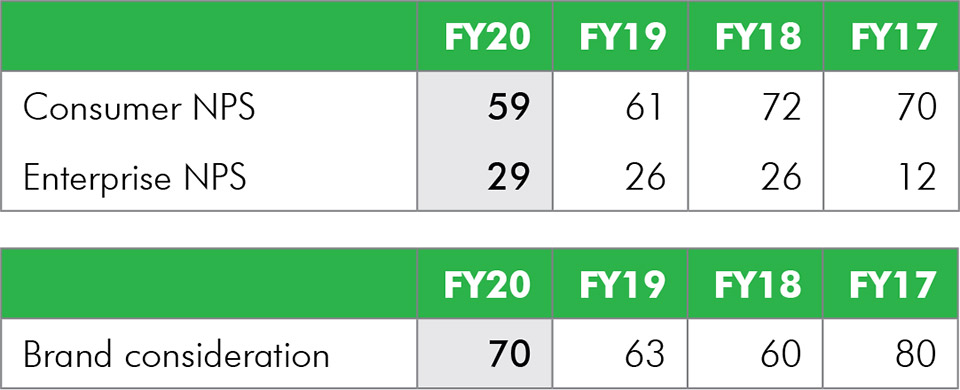
As the preceding tables illustrate, our Consumer NPS decreased significantly during the FY18-FY19 period, which we attributed to the perception then that our products and services were expensive and the decrease in consumer trust that occurred when we introduced faster data speeds. At the time, some customers were surprised by how much quicker data bundles were consumed at the faster speeds and distrusted the balances on their accounts as a result.
Since then, we have worked hard to win back customer trust by focusing on the affordability of our products and services and reducing their complexity. An illustration of our efforts in this regard was the For You campaign we launched in October 2019. The campaign sought to renew our commitment to our customers to be simple, transparent and honest.
The ‘For You’ campaign has improved our BC score by seven points and we closed out the year at 70, which suggests that we are slowly winning back customers and their trust. The ‘For You’ campaign also helped stabilise and improve our Consumer NPS by three points, but we still closed the year at 59 and appreciate that we still have work to do.
We also revamped all monthly plans to the Safaricom Karibu Postpay proposition as we continue to drive the agenda of bringing in simplicity of products. Within a month of the launch, we had 27 000 new customers on the revamped Postpay bundles (as at 31 March 2020).
Our Enterprise NPS remained steady during the year and we are still placed first in Kenya, with a score of 29 at the end of the year. Our challenge is to grow our score and we see automation and streamlining of processes as key to doing so. We have been working hard on automating the sales-to-order phase of the process this year and will launch our new processes in July 2020. We anticipate that the improved efficiency and convenience of the processes will result in an increase in our NPS score in the next financial year.
![]() Changing our brand promise ‘For You’
Changing our brand promise ‘For You’
We changed our brand promise from ‘Twaweza’ to ‘For You’, which articulates our commitment to the needs of our customers. Among the significant changes we made as part of this campaign were:
-
 A commitment to serve our more than 33 million customers in under five minutes, both at our 50 plus Safaricom shops across the country and the Call Centre.
A commitment to serve our more than 33 million customers in under five minutes, both at our 50 plus Safaricom shops across the country and the Call Centre. -
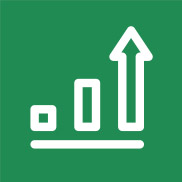 An increase in the sizes of available data bundles by more than 45 per cent, especially for the more affordable price points between one and 20 shillings.
An increase in the sizes of available data bundles by more than 45 per cent, especially for the more affordable price points between one and 20 shillings. -
 From 1 November 2019, new customers joining the network receive SIM cards for free at Safaricom shops and dealer outlets.
From 1 November 2019, new customers joining the network receive SIM cards for free at Safaricom shops and dealer outlets. -
 A customer purchasing five shillings’ worth of data will now receive 10 MBs that will not expire, instead of 7 MBs that expires in 24 hours.
A customer purchasing five shillings’ worth of data will now receive 10 MBs that will not expire, instead of 7 MBs that expires in 24 hours. -
 New customers also have the freedom to use their choice of number when they purchase a new line.
New customers also have the freedom to use their choice of number when they purchase a new line. -
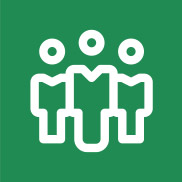 Reorganising our shops across the country to provide a more personalised experience to customers.
Reorganising our shops across the country to provide a more personalised experience to customers.
Enterprise customers

Overall, it was a year of good progress and solid growth. We divide our enterprise customers are into three major groups: Large Enterprises, Small-to-Medium Enterprises (SMEs), and Small Offices-Home Offices (SOHOs). We currently have a presence in over 286 000 enterprise customers, which represents an increase of more than 105 000 customers from the previous year. This growth can be attributed to the acquisition of 21 000 SME and 85 000 SOHO customers.
Our continued growth in enterprise customers is the result of a combination of factors. The accelerated rollout of our fibre optic network has allowed us to aggressively acquire both SOHO and SME customers. Likewise, our 4G LTE fixed data internet connectivity for SME customers has seen excellent growth and we closed the year with over 10 000 connections. This was supported by our competitively priced Easy 50GB and 30 GB Data Bundles.
We have also maintained our leading position in terms of large enterprise and public sector customers through a combination of aggressive pricing of fixed services and an expanded range of sophisticated solutions that take advantage of our skills in cloud computing, IoT and cyber security. Our powerful offering of end-to-end ICT services has positioned us as the digital services provider of choice for this market segment.
Customer engagement
The main channels our customers use to engage with us are through our call centre and our IVR and ZURI chatbot self-service options. Our Customer Operations team uses a variety of industry-standard metrics and thresholds to measure and monitor these diverse engagements.
Call centre performance
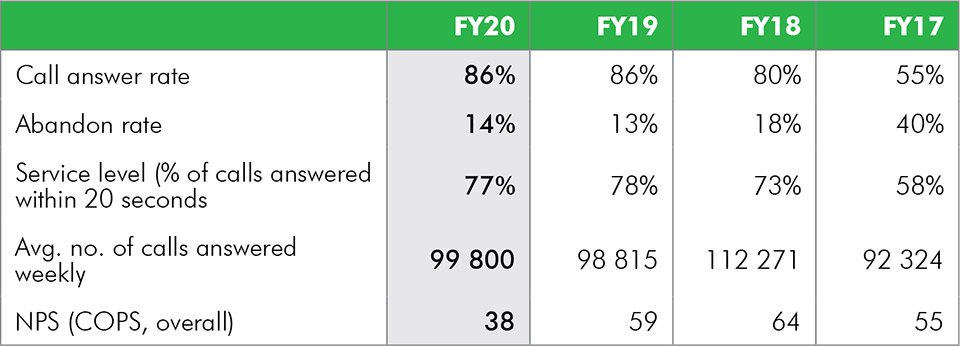
Overall, our performance was short of the thresholds we set for ourselves and, as a result, we have increased our pool of contract teams to enhance accessibility for our customers.
We also set ourselves the ambitious target of achieving a Customer Operations NPS of 50 overall in FY20, but achieved 38 for the year, due to accessibility challenges. Within this, our self-service chatbot ZURI was our top performing customer service channel and contributed 56 per cent of our overall NPS performance. This result suggests that the service is handling customer queries satisfactorily and we consider this an opportunity to increase and expand its offerings.
Channel performance

ZURI users
Call centre performance

Growth in remote working
One of the the significant changes during the year was the accelerated transition to remote working. The number of call centre agents working from home grew from 170 at the start of the year to 856 by April 2020. We are also pleased to report that 79 of the current cohort are persons living with disabilities. Power outages are biggest challenge we have faced; nonetheless, our remote working agents continue to post good performance with an average of 15 calls per hour answered.
![]() Call center support for COVID-19 response
Call center support for COVID-19 response
The first case of COVID-19 in Kenya was reported on 4 March 2020. In response, we partnered with the Ministry of Health to establish a 719 hotline to provide information and report cases. We set up USSD and IVR-based information services and two escalation lines (to doctors and the government rapid response team). A further 307 front line call centre agents were identified and trained to provide information, counselling and basic first aid. The service was designed, built, and made available to the public in 10 days.
![]() Looking ahead
Looking ahead
- Supporting our customers navigate through challenges brought about by COVID-19
- Working on winning back the trust of the customer
- We will strive to achieve our service level target of 80 per cent.
- We will automate the onboarding process for enterprise customers.
- We will achieve Call centre SLA target of 80 per cent.
- We will continue to expand and enhance our self-service channels, such as Zuri.

